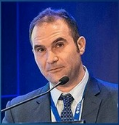Type: Technical Lecture Series
Title: Reliability and Resilience in Low-carbon, Low-inertia Power Systems – IEEE PES Distinguished Lecture
Speaker: Prof. Pierluigi Mancarella , PhD
Date: 7th June 2017
Time: 17:30 – 18:30
Location: D7, Renold Building, Sackville Street, Manchester M1 3BU
Free Refreshments will be provided for all attendees.
LECTURE DETAILS:
Our understanding of the classical reliability concepts of security and adequacy is increasingly being challenged by: (a) growing shares of variable renewable energy sources that require new system operation approaches, particularly to deal with decreasing levels of inertia and larger balancing and reserve requirements; and (b) the more frequent occurrence of extreme events (for instance driven by climate change) with potentially catastrophic impacts. There then may be situations when these two challenges occur simultaneously, such as in the September 2016 South Australia “Black System” event.
The primary aim of this IEEE PES Distinguished Lecture is to discuss how, based on both technical and economic considerations, there is a need for introducing new analysis and modelling frameworks that are capable to securely deal with low-inertia system operation and make future low-carbon power systems more resilient to high-impact, low-probability events. The key desirable features of such frameworks will be presented, alongside a suite of modelling tools recently developed and relevant metrics that can support assessing risk and resilience of future systems.
The key question that will then be asked is whether the system should be made “bigger” (e.g., making the system more redundant or robust, through investment into new transmission and generation asset, component hardening, etc.) or “smarter”. Consideration for the latter will include analyzing the role of new operational strategies (e.g., frequency response-constrained optimal power flow, dynamic scheduling of the largest contingency, controlled islanding, etc.) as well as of smart grid technologies (e.g., Fast Frequency Response from various sources, system integrity protection schemes, etc.).
The South Australia “Black System” event of September 2016 (and its consequences) will be taken as a case study to illustrate some of the general concepts presented, with particular focus on new security requirements (particularly for frequency response and voltage stability) that could also help in dealing with extreme events in low-inertia power systems.
Key recommendations to make future low-carbon, low-inertia power systems more reliable and resilient will finally be provided.
SPEAKER’S BIOGRAPHY:

Pierluigi Mancarella is Chair Professor of Electrical Power Systems at the University of Melbourne, Australia, and part-time Professor of Smart Energy Systems at the University of Manchester, UK.
Pierluigi obtained the PhD degree in Electrical Energy Systems from the Politecnico di Torino, Italy, and later held Research Associate at Imperial College London, UK and visiting research positions at Sintef/NTNU in Norway and NREL in Colorado. He also held visiting professorships at Ecole Centrale de Lille in France and the Universidad de Chile.
Pierluigi has been involved in/led, in the last 10 years, some 50 research projects, consultancy and professional activities in the UK, Europe and Australia. He areas of interests are techno-economics of smart grid technologies and distributed energy systems, risk and resilience assessment of future networks, integrated multi-energy systems modelling, and energy infrastructure investment under uncertainty.
Pierluigi is author/editor of four books, several book chapters, and over 200 research papers. He is an Editor of the IEEE Transactions on Smart Grid, the IEEE Systems Journal, and the International Journal of Electrical Power and Energy Systems. He also serves as a Guest Editor of the Philosophical Transactions of the Royal Society A.
Pierluigi is an IEEE Power and Energy Society Distinguished Lecturer, and the past Chair of the Energy Working Group of the IEEE European Public Policy Initiative.
REGISTER: Here